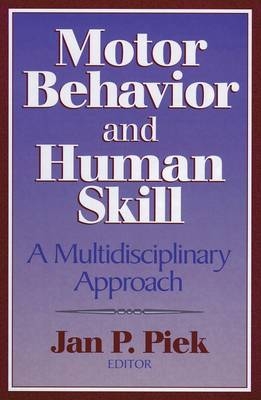
Motor Behavior and Human Skill
Human Kinetics (Verlag)
978-0-88011-675-6 (ISBN)
- Titel ist leider vergriffen;
keine Neuauflage - Artikel merken
Jan P. Piek, PhD, is a research fellow at the Curtin University of Technology in Perth, Australia. Her major areas of research are motor control and motor development. Since 1992 she has received three research fellowships to conduct work in motor control. Piek has published widely in journals in Australia and internationally. She contributed a chapter on spontaneous movements in the acquisition of motor coordination in infants to D.J. Glencross and J.P. Piek's Motor Control and Sensory-Motor Integration: Issues and Directions (Amsterdam: Elsevier Science, 1995). Piek has coordinated the Motor Control & Human Skill Research Workshops since the program's inception in 1991. She is a member of the School of Psychology at Curtin University of Technology, where she also manages the Research Centre for Applied Psychology. She received the Vice-Chancellor's Award for Excellence from Curtin University of Technology in 1996. Her most recent fellowship is the Curtin University Postdoctoral Research Fellowship, from 1997 to 2000. Jan and her husband Bill live in Ballajura, Western Australia. Her favorite leisure activities include reading, fishing, and walking.
Part I. Skill Acquisition and RetentionChapter 1. Sequential Representation and the Neural Basis of Motor SkillsSteven W. Keele, Matthew Davidson, and Amy HayesChapter 2. The Locus of Distance-Location Interference in Movement Reproduction: Do We Know Any More 25 Years On?Kuniyasu Imanaka, Bruce Abernethy, and Jin-Jong QuekChapter 3. Optimizing the Use of Vision During Motor Skill AcquisitionDigby Elliott and James LyonsPart II. Computational Modeling of Motor PerformanceChapter 4. Adaptation to a Changed Sensory-Motor Relation: Immediate and Delayed Parametric ModificationsNicholas J. O'Dwyer and Peter D. NeilsonChapter 5. Evidence for Rapid Switching of Sensory-Motor ModelsPeter D. Neilson, Megan D. Neilson, and Nicholas J. O'DwyerChapter 6. A Neural Oscillator Model Learning Given Trajectories, or How an "Allo-Imitation Algorithm" Can Be Implemented Into a Motor ControllerKarl Th. Kalveram Part III. A Dynamical Systems Approach to Motor Control Chapter 7. The Nature of Movement VariabilityKarl M. Newell and Andrew B. SlifkinChapter 8. Information-Based Dynamics and Manual Asymmetries in Perception and ActionWinston D. Byblow and Romeo ChuaChapter 9. Intentional Switching Between Patterns of Coordination in Bimanual Circle DrawingIrina J. Wuyts, Winston D. Byblow, Jeffery J. Summers, Richard G. Carson, and Andras Semjen Chapter 10. Moving Beyond Phenomenology: Neuromuscular-Skeletal Constraints Upon Coordination DynamicsRichard G. Carson and Stephan RiekPart IV. Normal and Abnormal Motor Development in Infancy and Childhood Chapter 11. The Influence of Preterm Birth on Early Motor DevelopmentJan P. PiekChapter 12. The Development of Kinesthesis and Its Relationship to Motor Ability in Preschool ChildrenDavid J. Livesey and Rebecca ColemanChapter 13. Process-Oriented Approach to Diagnosis and Treatment of Perceptual-Motor DysfunctionJudith I. LaszloChapter 14. The Influence of Context in the Development of Reaching and Grasping: Implications for Assessment of DisabilityJudith L. Charlton, Elfriede Ihsen, and Jennie Oxley Part V. Motor Control and the Basal Ganglia: Theory and Application to DisabilityChapter 15. Motor Sequencing Problems in Parkinson's Disease, Huntington's Disease, and Tourette's Syndrome 1: A Review of Basal Ganglia InvolvementJohn L. Bradshaw, Nellie Georgiou, Jim G. Phillips, Robert Iansek, Edmond Chiu, Ross Cunnington, and Dianne SheppardChapter 16. Motor Sequencing Problems in Parkinson's Disease, Huntington's Disease, and Tourette's Syndrome 2: Recent Findings Involving the Provision of Advance InformationNellie Georgiou, John L. Bradshaw, Dianne Sheppard, Edmond Chiu, Robert Iansek, Jim G. Phillips, and Ross CunningtonChapter 17. Evidence for Motor Skill Learning in Parkinson's DiseaseMeg E. Morris, Janice M. Collier, Thomas A. Matyas, Jeffery J. Summers, and Robert IansekPart VI. Paradigm Crisis: Is There a Compromise?Chapter 18. Referential Behavior Theory: A Framework for Multiple Perspectives on Motor ControlJeffrey PressingChapter 19. Has Ecological Psychology Delivered What It Promised?Jeffery J. SummersChapter 20. Replies to J.J. Summers: Has Ecological Psychology Delivered What It Promised?Commentary 1 by Steven Keele: Programming or Planning Conceptions of Motor Control Speak to Different Phenomena Than Dynamical System ConceptionsCommentary 2 by Richard Carson: Ecological Psychology and Movement Dynamics: A Plea for Biological RealismCommentary 3 by Jeffrey Pressing: The Scope of Ecological DesignsCommentary 4 by Karl Newell: Action and Ecological Psychology: A Winter's View From Summers
| Erscheint lt. Verlag | 1.6.1998 |
|---|---|
| Zusatzinfo | 87 black & white illustrations, 3 black & white halftones |
| Verlagsort | Champaign, IL |
| Sprache | englisch |
| Maße | 165 x 241 mm |
| Gewicht | 930 g |
| Themenwelt | Geisteswissenschaften ► Psychologie ► Biopsychologie / Neurowissenschaften |
| Medizin / Pharmazie ► Medizinische Fachgebiete ► Sportmedizin | |
| Studium ► 1. Studienabschnitt (Vorklinik) ► Physiologie | |
| Naturwissenschaften ► Biologie ► Zoologie | |
| ISBN-10 | 0-88011-675-7 / 0880116757 |
| ISBN-13 | 978-0-88011-675-6 / 9780880116756 |
| Zustand | Neuware |
| Informationen gemäß Produktsicherheitsverordnung (GPSR) | |
| Haben Sie eine Frage zum Produkt? |
aus dem Bereich


